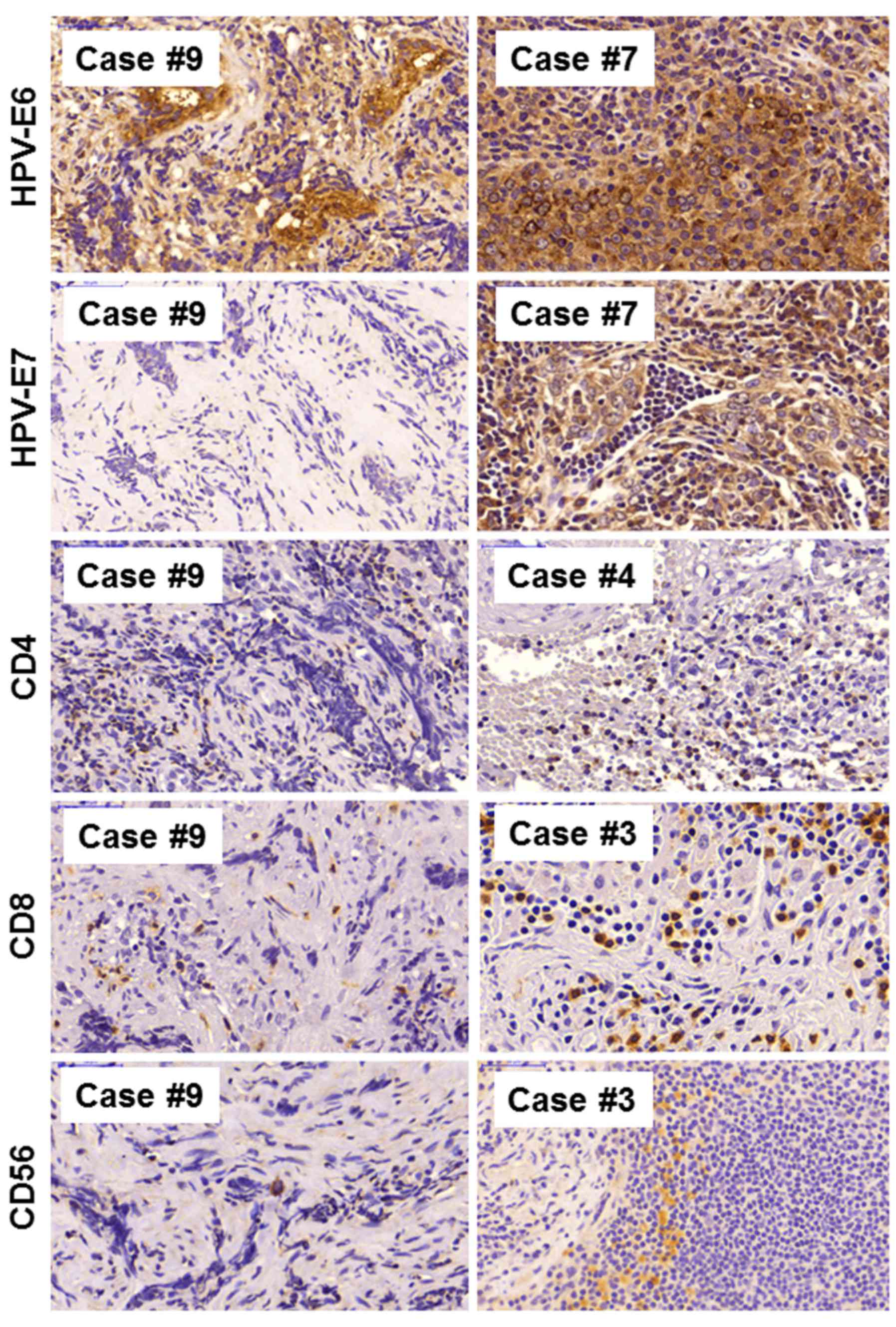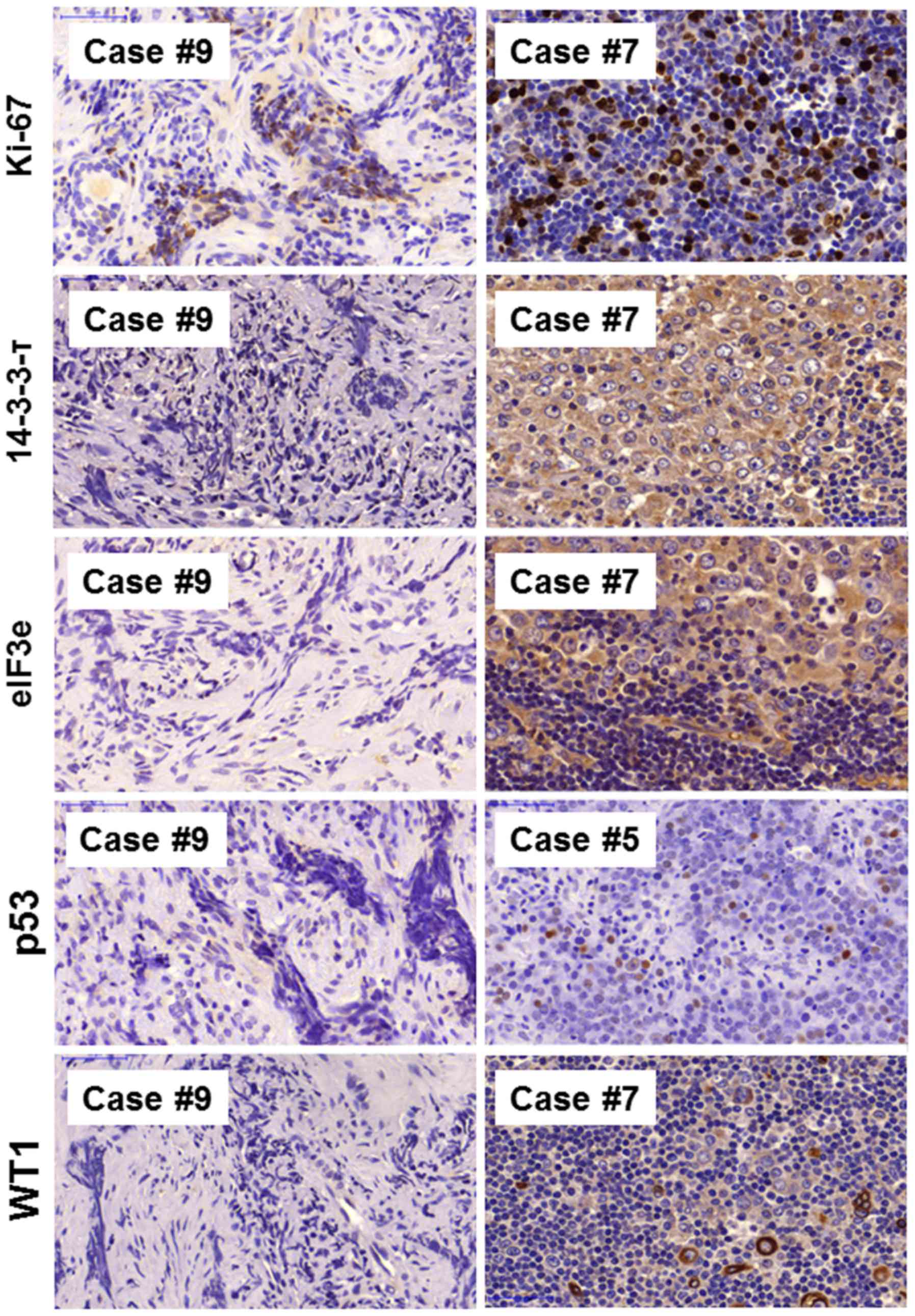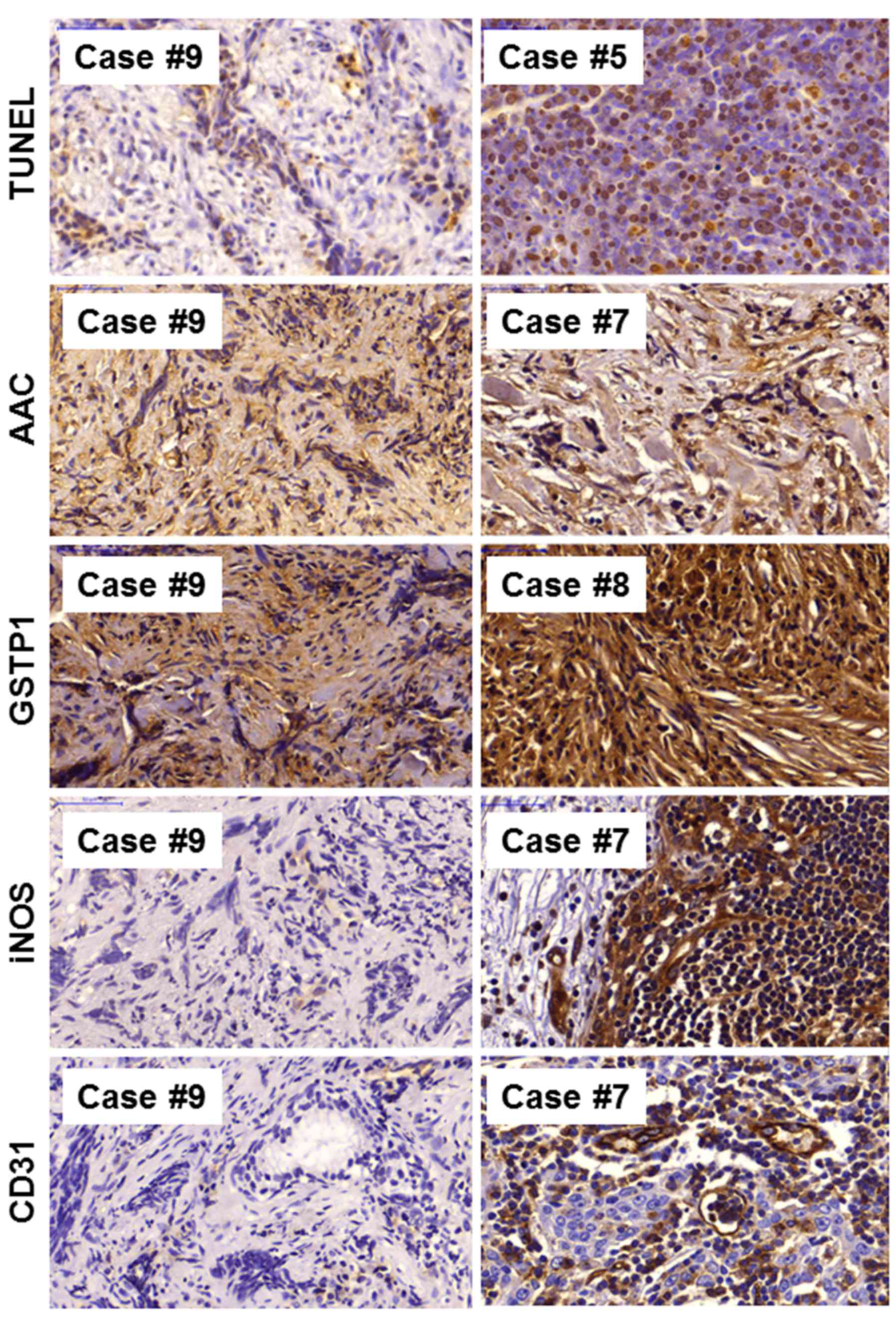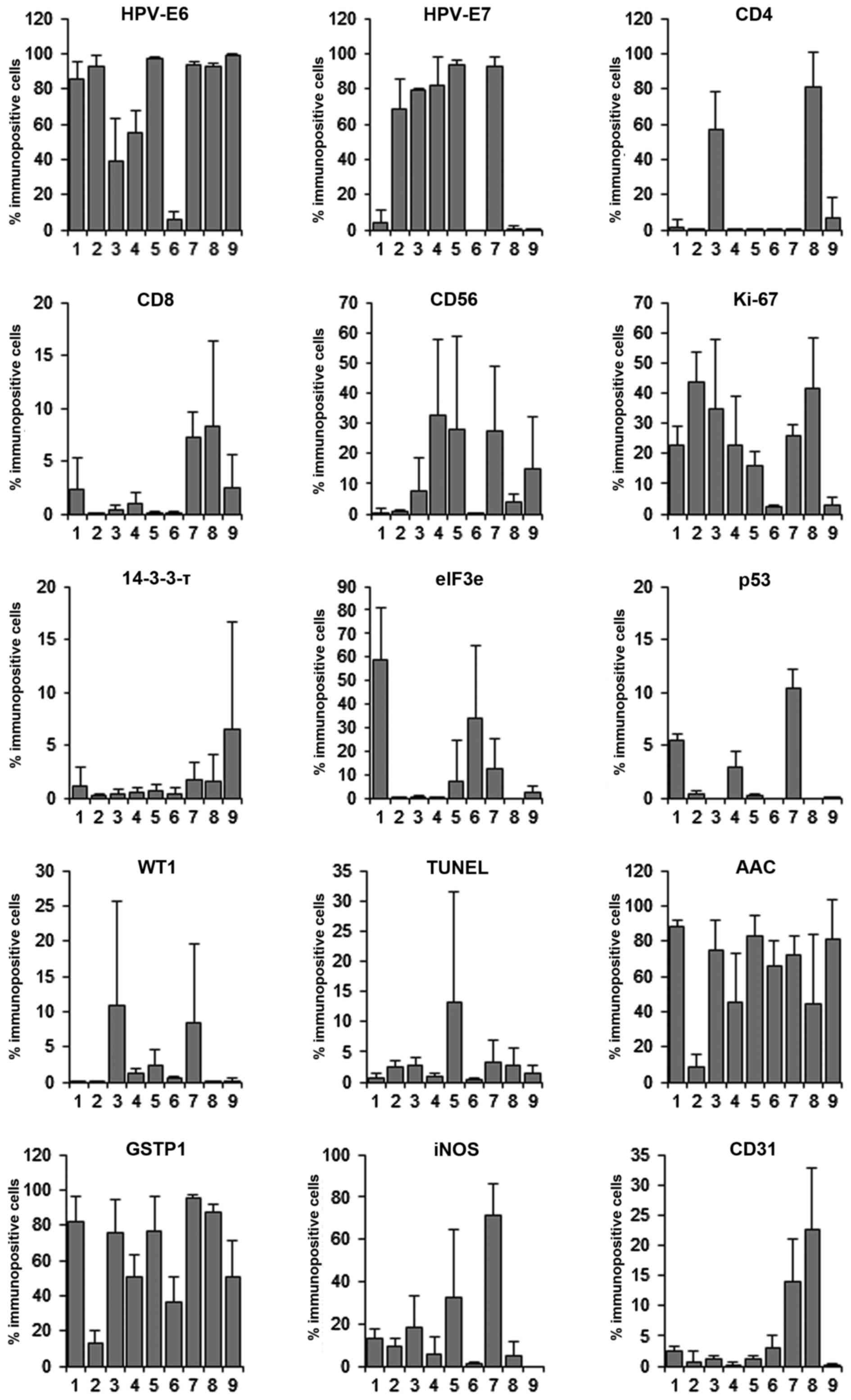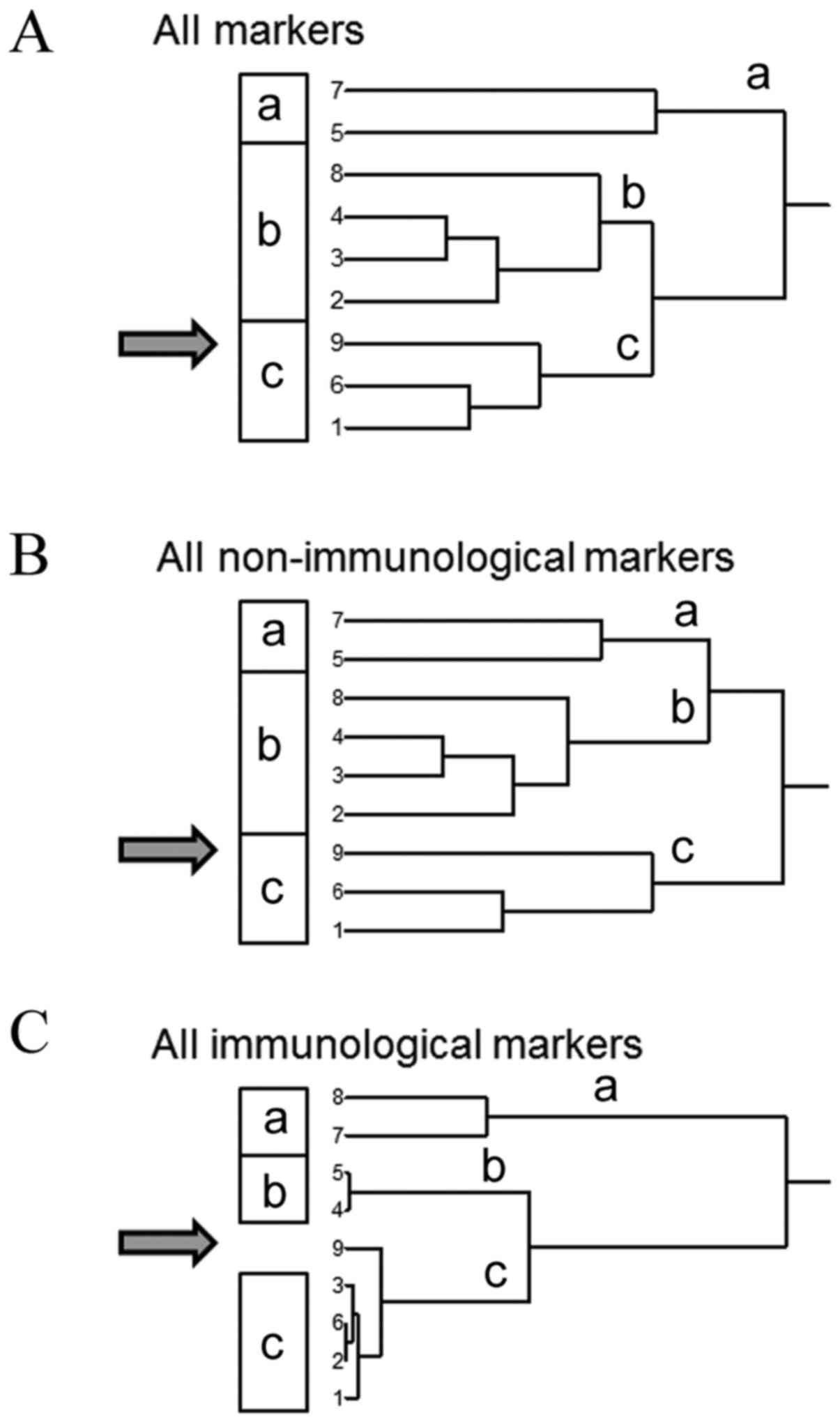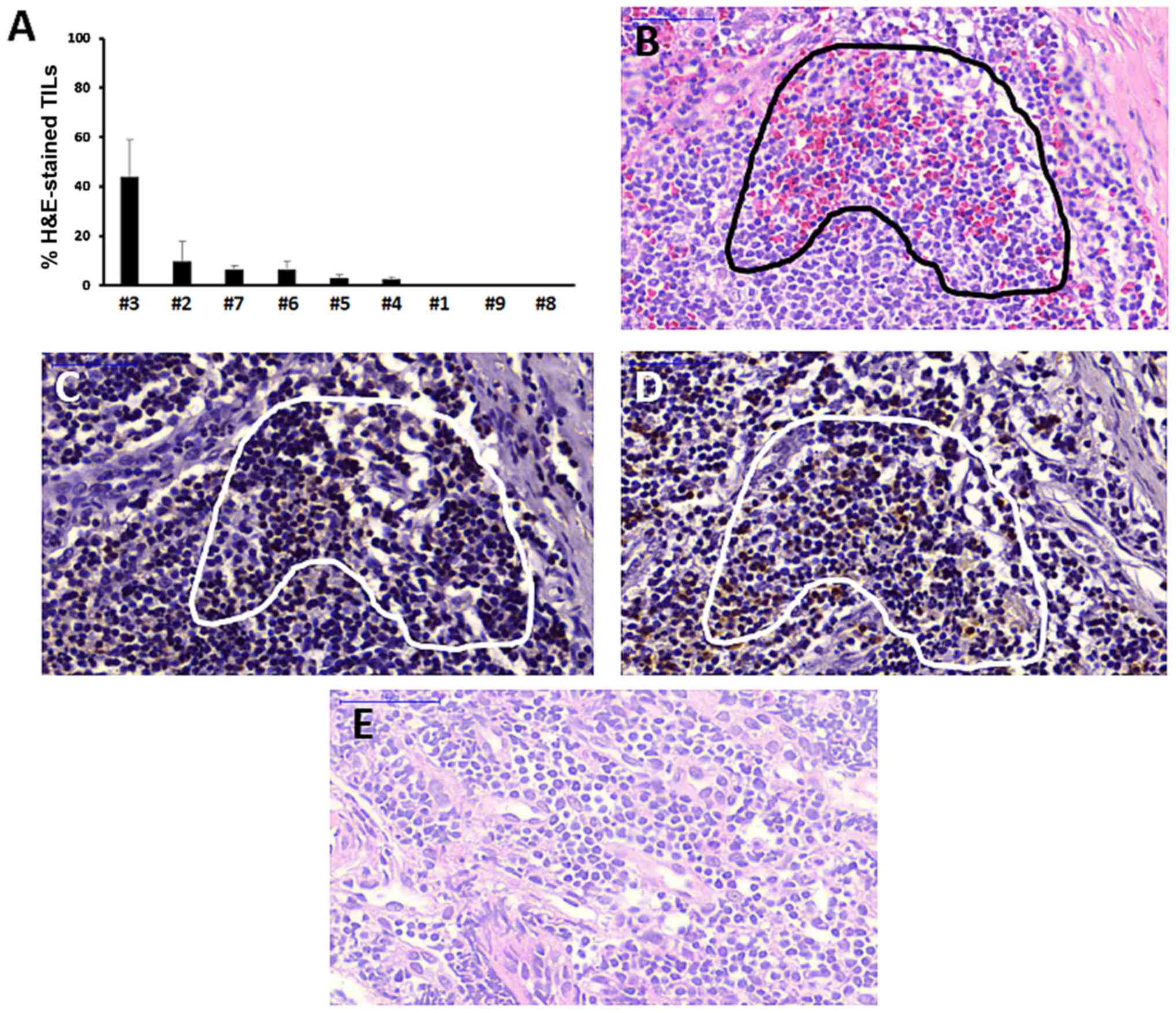|
1
|
Parkin DM and Muir CS: Cancer Incidence in
Five Continents. Comparability and quality of data. IARC Sci Publ.
120:45–173. 1992.
|
|
2
|
Chong VH, Telisinghe PU, Lim E, Abdullah
MS, Idris F and Chong CF: Declining incidence of nasopharyngeal
carcinoma in brunei darussalam: A three decade study (1986-2014).
Asian Pac J Cancer Prev. 16:7097–7101. 2015. View Article : Google Scholar : PubMed/NCBI
|
|
3
|
Ferlay J, Soerjomataram I, Dikshit R, Eser
S, Mathers C, Rebelo M, Parkin DM, Forman D and Bray F: Cancer
incidence and mortality worldwide: Sources, methods and major
patterns in GLOBOCAN 2012. Int J Cancer. 136:E359–E386. 2015.
View Article : Google Scholar
|
|
4
|
Healy GB: Malignant tumors of the head and
neck in children: Diagnosis and treatment. Otolaryngol Clin North
Am. 13:483–488. 1980.PubMed/NCBI
|
|
5
|
Cunningham MJ, Myers EN and Bluestone CD:
Malignant tumors of the head and neck in children: A twenty-year
review. Int J Pediatr Otorhinolaryngol. 13:279–292. 1987.
View Article : Google Scholar : PubMed/NCBI
|
|
6
|
Wang Y, Zhang Y and Ma S: Racial
differences in nasopharyngeal carcinoma in the United States.
Cancer Epidemiol. 37:793–802. 2013. View Article : Google Scholar : PubMed/NCBI
|
|
7
|
Chan AT, Teo PM and Johnson PJ:
Nasopharyngeal carcinoma. Ann Oncol. 13:1007–1015. 2002. View Article : Google Scholar : PubMed/NCBI
|
|
8
|
Society AC: Cancer Facts & Figures
2015 Nasopharyngeal Cancer. American Cancer Society; Atlanta, GA:
pp. 1–44. 2015
|
|
9
|
Singhi AD, Califano J and Westra WH:
High-risk human papillomavirus in nasopharyngeal carcinoma. Head
Neck. 34:213–218. 2012. View Article : Google Scholar
|
|
10
|
Robinson M, Suh YE, Paleri V, Devlin D,
Ayaz B, Pertl L and Thavaraj S: Oncogenic human
papillomavirus-associated nasopharyngeal carcinoma: An
observational study of correlation with ethnicity, histological
subtype and outcome in a UK population. Infect Agent Cancer.
8:302013. View Article : Google Scholar : PubMed/NCBI
|
|
11
|
Lo EJ, Bell D, Woo J, Li G, Hanna EY,
El-Naggar AK and Sturgis EM: Human papillomavirus & WHO type I
nasopharyngeal carcinoma. Laryngoscope. 120(Suppl 4): S1852010.
View Article : Google Scholar
|
|
12
|
Laantri N, Attaleb M, Kandil M, Naji F,
Mouttaki T, Dardari R, Belghmi K, Benchakroun N, El Mzibri M and
Khyatti M: Human papillomavirus detection in moroccan patients with
nasopharyngeal carcinoma. Infect Agent Cancer. 6:32011. View Article : Google Scholar : PubMed/NCBI
|
|
13
|
Giannoudis A, Ergazaki M, Segas J,
Giotakis J, Adamopoulos G, Gorgoulis V and Spandidos DA: Detection
of Epstein-Barr virus and human papillomavirus in nasopharyngeal
carcinoma by the polymerase chain reaction technique. Cancer Lett.
89:177–181. 1995. View Article : Google Scholar : PubMed/NCBI
|
|
14
|
Buehrlen M, Zwaan CM, Granzen B, Lassay L,
Deutz P, Vorwerk P, Staatz G, Gademann G, Christiansen H,
Oldenburger F, et al: Multimodal treatment, including interferon
beta, of nasopharyngeal carcinoma in children and young adults:
Preliminary results from the prospective, multicenter study
NPC-2003-GPOH/DCOG. Cancer. 118:4892–4900. 2012. View Article : Google Scholar : PubMed/NCBI
|
|
15
|
Kontny U, Franzen S, Behrends U, Bührlen
M, Christiansen H, Delecluse H, Eble M, Feuchtinger T, Gademann G,
Granzen B, et al: Diagnosis and treatment of nasopharyngeal
carcinoma in children and adolescents - Recommendations of the
GPOH-NPC Study Group. Klin Padiatr. 228:105–112. 2016. View Article : Google Scholar : PubMed/NCBI
|
|
16
|
Fischer AH, Jacobson KA, Rose J and Zeller
R: Hematoxylin and eosin staining of tissue and cell sections. CSH
Protoc. 2008:pdb.prot4986. 2008.
|
|
17
|
Salgado R, Denkert C, Demaria S, Sirtaine
N, Klauschen F, Pruneri G, Wienert S, Van den Eynden G, Baehner FL,
Penault-Llorca F, et al International TILs Working Group 2014: The
evaluation of tumor-infiltrating lymphocytes (TILs) in breast
cancer: Recommendations by an International TILs Working Group
2014. Ann Oncol. 26:259–271. 2015. View Article : Google Scholar
|
|
18
|
Kadioglu O and Efferth T: Pharmacogenomic
characterization of cytotoxic compounds from Salvia officinalis in
cancer cells. J Nat Prod. 78:762–775. 2015. View Article : Google Scholar : PubMed/NCBI
|
|
19
|
Schielke HJ, Fishman JL, Osatuke K and
Stiles WB: Creative consensus on interpretations of qualitative
data: The Ward method. Psychother Res. 19:558–565. 2009. View Article : Google Scholar : PubMed/NCBI
|
|
20
|
Efferth T, Fabry U and Osieka R: Apoptosis
and resistance to daunorubicin in human leukemic cells. Leukemia.
11:1180–1186. 1997. View Article : Google Scholar : PubMed/NCBI
|
|
21
|
Scherf U, Ross DT, Waltham M, Smith LH,
Lee JK, Tanabe L, Kohn KW, Reinhold WC, Myers TG, Andrews DT, et
al: A gene expression database for the molecular pharmacology of
cancer. Nat Genet. 24:236–244. 2000. View
Article : Google Scholar : PubMed/NCBI
|
|
22
|
Mocellin S, Provenzano M, Rossi CR, Pilati
P, Nitti D and Lise M: DNA array-based gene profiling: From
surgical specimen to the molecular portrait of cancer. Ann Surg.
241:16–26. 2005.
|
|
23
|
Eisen MB, Spellman PT, Brown PO and
Botstein D: Cluster analysis and display of genome-wide expression
patterns. Proc Natl Acad Sci USA. 95:14863–14868. 1998. View Article : Google Scholar : PubMed/NCBI
|
|
24
|
Perou CM, Sørlie T, Eisen MB, van de Rijn
M, Jeffrey SS, Rees CA, Pollack JR, Ross DT, Johnsen H, Akslen LA,
et al: Molecular portraits of human breast tumours. Nature.
406:747–752. 2000. View
Article : Google Scholar : PubMed/NCBI
|
|
25
|
Ross DT, Scherf U, Eisen MB, Perou CM,
Rees C, Spellman P, Iyer V, Jeffrey SS, Van de Rijn M, Waltham M,
et al: Systematic variation in gene expression patterns in human
cancer cell lines. Nat Genet. 24:227–235. 2000. View Article : Google Scholar : PubMed/NCBI
|
|
26
|
Yang J, Zhou M, Zhao R, Peng S, Luo Z, Li
X, Cao L, Tang K, Ma J, Xiong W, et al: Identification of candidate
biomarkers for the early detection of nasopharyngeal carcinoma by
quantitative proteomic analysis. J Proteomics. 109:162–175. 2014.
View Article : Google Scholar : PubMed/NCBI
|
|
27
|
Cheuk DK, Billups CA, Martin MG, Roland
CR, Ribeiro RC, Krasin MJ and Rodriguez-Galindo C: Prognostic
factors and long-term outcomes of childhood nasopharyngeal
carcinoma. Cancer. 117:197–206. 2011. View Article : Google Scholar
|
|
28
|
Volm M, Koomägi R, Mattern J and Efferth
T: Expression profile of genes in non-small cell lung carcinomas
from long-term surviving patients. Clin Cancer Res. 8:1843–1848.
2002.PubMed/NCBI
|
|
29
|
Volm M, Koomägi R, Mattern J and Efferth
T: Protein expression profiles indicative for drug resistance of
non-small cell lung cancer. Br J Cancer. 87:251–257. 2002.
View Article : Google Scholar : PubMed/NCBI
|
|
30
|
Volm M, Koomägi R, Mattern J and Efferth
T: Protein expression profile of primary human squamous cell lung
carcinomas indicative of the incidence of metastases. Clin Exp
Metastasis. 19:385–390. 2002. View Article : Google Scholar : PubMed/NCBI
|
|
31
|
Trempat P, Tabiasco J, Andre P, Faumont N,
Meggetto F, Delsol G, Gascoyne RD, Fournie JJ, Vivier E and
Brousset P: Evidence for early infection of nonneoplastic natural
killer cells by Epstein-Barr virus. J Virol. 76:11139–11142. 2002.
View Article : Google Scholar : PubMed/NCBI
|
|
32
|
Yuling H, Ruijing X, Li L, Xiang J, Rui Z,
Yujuan W, Lijun Z, Chunxian D, Xinti T, Wei X, et al: EBV-induced
human CD8+ NKT cells suppress tumorigenesis by
EBV-associated malignancies. Cancer Res. 69:7935–7944. 2009.
View Article : Google Scholar : PubMed/NCBI
|
|
33
|
Zheng Y, Cao KY, Ng SP, Chua DT, Sham JS,
Kwong DL, Ng MH, Lu L and Zheng BJ: Complementary activation of
peripheral natural killer cell immunity in nasopharyngeal
carcinoma. Cancer Sci. 97:912–919. 2006. View Article : Google Scholar : PubMed/NCBI
|
|
34
|
Mahmoud SM, Paish EC, Powe DG, Macmillan
RD, Grainge MJ, Lee AH, Ellis IO and Green AR: Tumor-infiltrating
CD8+ lymphocytes predict clinical outcome in breast
cancer. J Clin Oncol. 29:1949–1955. 2011. View Article : Google Scholar : PubMed/NCBI
|
|
35
|
Haigh TA, Lin X, Jia H, Hui EP, Chan AT,
Rickinson AB and Taylor GS: EBV latent membrane proteins (LMPs) 1
and 2 as immunotherapeutic targets: LMP-specific CD4+
cytotoxic T cell recognition of EBV-transformed B cell lines. J
Immunol. 180:1643–1654. 2008. View Article : Google Scholar : PubMed/NCBI
|
|
36
|
Stoker SD, Novalić Z, Wildeman MA, Huitema
AD, Verkuijlen SA, Juwana H, Greijer AE, Tan IB, Middeldorp JM and
de Boer JP: Epstein-Barr virus-targeted therapy in nasopharyngeal
carcinoma. J Cancer Res Clin Oncol. 141:1845–1857. 2015. View Article : Google Scholar : PubMed/NCBI
|
|
37
|
Taylor GS, Haigh TA, Gudgeon NH, Phelps
RJ, Lee SP, Steven NM and Rickinson AB: Dual stimulation of
Epstein-Barr Virus (EBV)-specific CD4+- and
CD8+-T-cell responses by a chimeric antigen construct:
Potential therapeutic vaccine for EBV-positive nasopharyngeal
carcinoma. J Virol. 78:768–778. 2004. View Article : Google Scholar :
|
|
38
|
Comoli P, De Palma R, Siena S, Nocera A,
Basso S, Del Galdo F, Schiavo R, Carminati O, Tagliamacco A, Abbate
GF, et al: Adoptive transfer of allogeneic Epstein-Barr virus
(EBV)-specific cytotoxic T cells with in vitro antitumor activity
boosts LMP2-specific immune response in a patient with EBV-related
nasopharyngeal carcinoma. Ann Oncol. 15:113–117. 2004. View Article : Google Scholar
|
|
39
|
Chevrollier A, Loiseau D, Reynier P and
Stepien G: Adenine nucleotide translocase 2 is a key mitochondrial
protein in cancer metabolism. Biochim Biophys Acta. 1807:562–567.
2011. View Article : Google Scholar
|
|
40
|
Wang Z and Sun Y: Targeting p53 for novel
anticancer therapy. Transl Oncol. 3:1–12. 2010. View Article : Google Scholar : PubMed/NCBI
|
|
41
|
Vogelstein B, Lane D and Levine AJ:
Surfing the p53 network. Nature. 408:307–310. 2000. View Article : Google Scholar : PubMed/NCBI
|
|
42
|
Giaccia AJ and Kastan MB: The complexity
of p53 modulation: Emerging patterns from divergent signals. Genes
Dev. 12:2973–2983. 1998. View Article : Google Scholar : PubMed/NCBI
|
|
43
|
Scheffner M, Werness BA, Huibregtse JM,
Levine AJ and Howley PM: The E6 oncoprotein encoded by human
papillomavirus types 16 and 18 promotes the degradation of p53.
Cell. 63:1129–1136. 1990. View Article : Google Scholar : PubMed/NCBI
|
|
44
|
Matlashewski G, Banks L, Wu-Liao J, Spence
P, Pim D and Crawford L: The expression of human papillomavirus
type 18 E6 protein in bacteria and the production of anti-E6
antibodies. J Gen Virol. 67:1909–1916. 1986. View Article : Google Scholar : PubMed/NCBI
|
|
45
|
Yim EK and Park JS: The role of HPV E6 and
E7 oncoproteins in HPV-associated cervical carcinogenesis. Cancer
Res Treat. 37:319–324. 2005. View Article : Google Scholar : PubMed/NCBI
|
|
46
|
Kim KH and Sederstrom JM: Assaying cell
cycle status using flow cytometry. Curr Protoc Mol Biol.
111:28.6.1–11. 2015. View Article : Google Scholar
|
|
47
|
Urruticoechea A, Smith IE and Dowsett M:
Proliferation marker Ki-67 in early breast cancer. J Clin Oncol.
23:7212–7220. 2005. View Article : Google Scholar : PubMed/NCBI
|
|
48
|
Liu P, Sun YL, Du J, Hou XS and Meng H:
CD105/Ki67 coexpression correlates with tumor progression and poor
prognosis in epithelial ovarian cancer. Int J Gynecol Cancer.
22:586–592. 2012. View Article : Google Scholar : PubMed/NCBI
|
|
49
|
Masuda M, Shinokuma A, Hirakawa N,
Nakashima T and Komiyama S: Expression of bcl-2-, p53, and Ki-67
and outcome of patients with primary nasopharyngeal carcinomas
following DNA-damaging treatment. Head Neck. 20:640–644. 1998.
View Article : Google Scholar : PubMed/NCBI
|
|
50
|
Hershey JW: The role of eIF3 and its
individual subunits in cancer. Biochim Biophys Acta. 1849:792–800.
2015. View Article : Google Scholar
|
|
51
|
Dong Z, Liu Z, Cui P, Pincheira R, Yang Y,
Liu J and Zhang JT: Role of eIF3a in regulating cell cycle
progression. Exp Cell Res. 315:1889–1894. 2009. View Article : Google Scholar : PubMed/NCBI
|
|
52
|
Yin JY, Shen J, Dong ZZ, Huang Q, Zhong
MZ, Feng DY, Zhou HH, Zhang JT and Liu ZQ: Effect of eIF3a on
response of lung cancer patients to platinum-based chemotherapy by
regulating DNA repair. Clin Cancer Res. 17:4600–4609. 2011.
View Article : Google Scholar : PubMed/NCBI
|
|
53
|
Lala PK and Orucevic A: Role of nitric
oxide in tumor progression: Lessons from experimental tumors.
Cancer Metastasis Rev. 17:91–106. 1998. View Article : Google Scholar : PubMed/NCBI
|
|
54
|
Wink DA, Ridnour LA, Hussain SP and Harris
CC: The reemergence of nitric oxide and cancer. Nitric Oxide.
19:65–67. 2008. View Article : Google Scholar : PubMed/NCBI
|
|
55
|
Beckman JS, Beckman TW, Chen J, Marshall
PA and Freeman BA: Apparent hydroxyl radical production by
peroxynitrite: Implications for endothelial injury from nitric
oxide and superoxide. Proc Natl Acad Sci USA. 87:1620–1624. 1990.
View Article : Google Scholar : PubMed/NCBI
|
|
56
|
Jayasurya A, Dheen ST, Yap WM, Tan NG, Ng
YK and Bay BH: Inducible nitric oxide synthase and bcl-2 expression
in naso-pharyngeal cancer: Correlation with outcome of patients
after radiotherapy. Int J Radiat Oncol Biol Phys. 56:837–845. 2003.
View Article : Google Scholar : PubMed/NCBI
|
|
57
|
Kane AJ, Barker JE, Mitchell GM, Theile
DR, Romero R, Messina A, Wagh M, Fraulin FO, Morrison WA and
Stewart AG: Inducible nitric oxide synthase (iNOS) activity
promotes ischaemic skin flap survival. Br J Pharmacol.
132:1631–1638. 2001. View Article : Google Scholar : PubMed/NCBI
|















